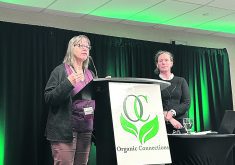The industry has officially come out against the technology, but some farmers and scientists disagree with that stance
About four years ago, in the winter of 2018, the organic sector said it opposed gene-edited crops.
The International Federation of Organic Agricultural Movements (IFOAM) said, in a paper, that “new genetic engineering technologies… are not compatible with organic farming and must not be used in organic breeding or organic production.”
That seems like a clear “no” around gene editing.
But the debate over gene-edited crops is not over in organics. Some farmers and industry leaders support gene editing.
Others do not.
Read Also

New coal mine proposal met with old concerns
A smaller version of the previously rejected Grassy Mountain coal mine project in Crowsnest Pass is back on the table, and the Livingstone Landowners Group continues to voice concerns about the environmental risks.
“It is a very polarizing topic,” said Susanna Klassen, who is working on her PhD in sustainable food systems at the University of British Columbia.
“People tend to be on one side or other of this debate.”
Gene editing, or genome editing, is technology where scientists can delete or change specific genes in a plant to achieve desired traits. It’s different from the old transgenic technology, used to develop genetically modified crops. Some experts believe it could transform plant science and allow plant breeders to develop crop varieties more rapidly.
Since it could transform varietal development, Klassen and her UBC colleague, Sara Nawaz, wanted to understand how people in Canada’s organic sector feel about gene edited crops.
“There’s some work out there (asking) if gene editing is compatible with organic…. But we really hadn’t found anything (on) what people in the sector actually think about it”
So, in 2020 they spoke with organic industry leaders from Canada and the U.S. Following the interviews, they published a paper with their findings in the journal Elementa. The title of the paper is “Tensions at the boundary: Rearticulating ‘organic’ plant breeding in the age of gene editing.”
One thing they learned is that organic leaders worry about the customer.
Since organic consumers are probably hostile or wary about genomic technologies, the organic sector had little choice on gene editing.
“One of the key perceptions, among the (people) we talked to, was that this is what consumers want. And this is what the sector had to do, to meet those (wants),” said Nawaz, who is with the Institute for Resources, Environment and Sustainability at UBC. “That really came up (often)… as a theme that a lot of people cited.”
Klassen made a similar comment. Many consumers buy organic food because it doesn’t contain certain things. No pesticides, no GM technology and no gene editing.
“(It) felt like there was a lot of pressure on the industry to do that (reject gene editing)…. I think the organic sector was in a difficult position…. And organic farmers depend on these premiums, that people will pay higher prices for certified organic food.”
The participants in the interviews also cited other reasons for rejecting gene editing:
- environmental risk
- big corporations control the technology
- not needed to improve crop varieties
In a way, the arguments made against gene-edited crops were similar to the organic position on GM crops from 25 years ago.
In their interviews, Nawaz and Klassen mostly spoke with organic sector leaders or people who have the power to make decisions.
They interviewed only a few rank-and-file organic farmers, which could have affected the level of support for gene editing. Many organic growers in Canada struggle with pests, soil fertility and other factors that limit crop yields.
Saskatchewan Crop Insurance Corp. data from 2019-20 shows the average yield from organic crops is about 40 to 50 percent of conventional crops.
If gene editing produced a wheat variety with better resistance to fusarium head blight, for example, organic growers could boost yields.
“You might get a slightly different answer (from farmers),” Nawaz said.
Of the people they interviewed, plant breeders expressed the most interest in gene-edited crops. Some wondered if organic farmers would benefit from the technology.
“There was a lot of scientific fascination and awe… at the things that these technologies can do,” Nawaz said.
“But they did support the fact that it isn’t on the table.”


















